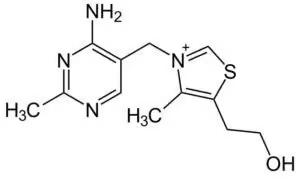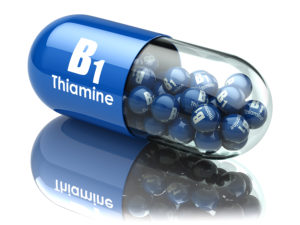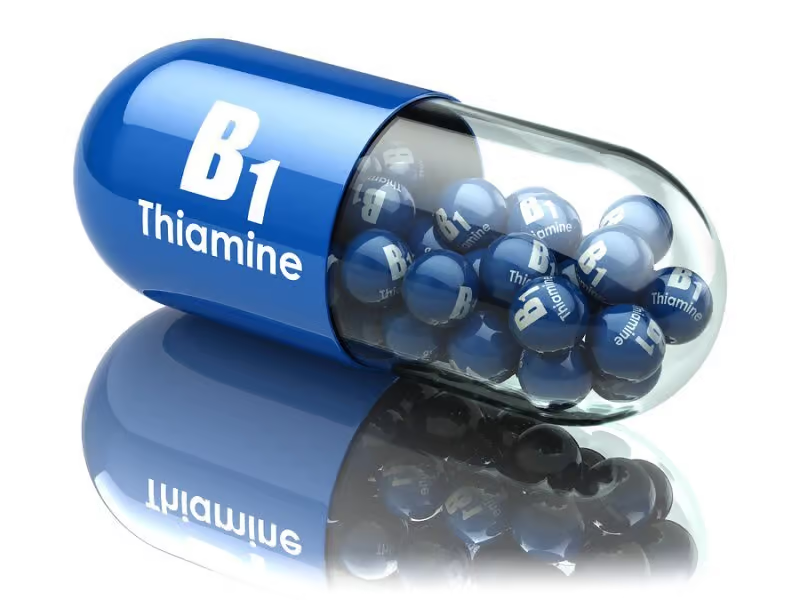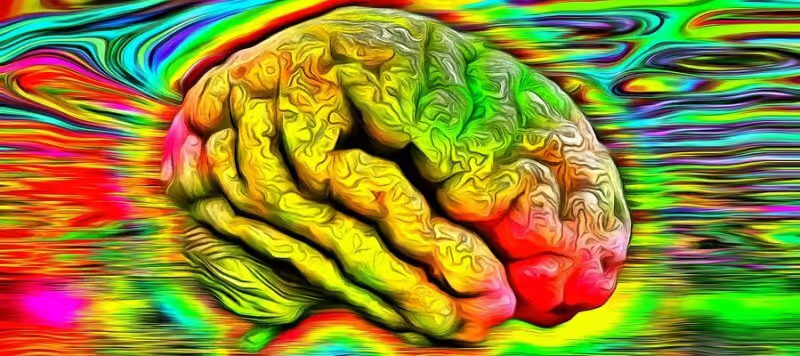Table of Contents
Vitamin B1 (Thiamine) is the first B Vitamin to be discovered by researchers. “Thio-vitamine” refers to its sulfur-containing content. It’s called B1 because it was the first of the B complex vitamins to be identified.
It was Kanehiro Takaki, surgeon general of the Japanese navy back in 1884 that figured something was amiss. Sailors were dying on his ships from a disease called Beriberi. And Takaki surmised it had something to do with sailors eating only white rice.
It wasn’t until 1897 that Christiaan Eijkman, a military doctor in the Dutch East Indies figured out that the bran removed from white rice was causing problems. Something was missing in the diet.
In 1911, Polish biochemist Casimir Funk isolated what he called a “vitamine” from rice bran. Dutch chemists went on to isolate and crystallize the active agent in 1926. US chemist Robert Williams determined the structure of Vitamin B1. And synthesized it in 1936.[i]
In Japan, it was found that insufficient thiamine led to a central nervous system disorder called Beriberi. But supplementing with thiamine alone didn’t help because of its poor bioavailability. A lot of thiamine was needed to cure Beriberi symptoms.
So Japanese scientists created a derivative of Vitamin B1 called Sulbutiamine in an attempt to quell the health crisis within the Japanese population.
Sulbutiamine is far more bioavailable than standard thiamine. It is fat-soluble (thiamine is water-soluble) which helps it more easily cross the blood-brain barrier.
Advanced neurohackers add Sulbutiamine to their stack instead of standard Vitamin B1 (thiamine) because it’s better absorbed and used by your brain than B1.
Thiamine is a coenzyme used by your body to metabolize food for energy. And to maintain proper heart, nerve and brain function.
Thiamine also helps digest and extract energy from food. It turns nutrients into adenosine triphosphate (ATP). ATP is the cellular energy source synthesized within mitochondria.
And thiamine helps convert carbohydrates into glucose. The energy your body uses for your brain and nervous system.
One more thing about this miracle B-vitamin. Thiamine contributes to the development of myelin sheaths which wrap around neurons to protect them from damage.
Vitamin B1 (Thiamine) helps:
- Brain Optimization: Thiamine is critical for increasing focus, energy, and preventing memory loss. And can ward off inflammation. Healthy brain function is crucial for good decision making.
- Neurotransmitters: Thiamine is essential for producing the neurotransmitter acetylcholine (ACh). ACh is used to relay messages between neurons in your brain. And is critical for cognition, learning and memory.
- Mood: Thiamine helps your body withstand stress. A lack of energy can contribute to poor mood and motivation. Thiamine can boost your mood, and defend against depression and anxiety.
What is Vitamin B1 (Thiamine)?
Vitamin B1 (Thiamine) is the first of the B-Complex vitamins identified. And designated B1 as a result.

Japanese researchers were the first to determine that something was missing in the diet of those who ate only polished rice.
Polished rice is one of the first “processed foods”. And of course there were problems right from the start. The bran coating on rice kernels contained what was later identified as thiamine (Vitamin B1).
The Japanese population were severely thiamine-deficient from this rice-only diet. Large numbers of the population were suffering from Beriberi. A central nervous system disorder caused by a lack of thiamine.
Once scientists determined it was thiamine that was behind a major, country-wide health crisis, they went on to develop Sulbutiamine. It was better absorbed by the brain than standard thiamine.
Your body does not produce thiamine on its own. So you must get it from food including beef, brewer’s yeast, legumes (beans, lentils), milk, nuts, oats, oranges, pork, rice, seeds, wheat, whole-grain cereals, and yeast.
But thiamine has poor bioavailability when taken as a nootropic supplement. A derivative of thiamine called Sulbutiamine is a fat-soluble compound that is easily digested. And readily crosses the blood-brain barrier.
Thiamine vs. Sulbutiamine: What’s the Difference?
Sulbutiamine is a synthetic version of Vitamin B1 (Thiamine). It is two B1 molecules chemically bonded together.
Thiamine is water-soluble and does not easily cross the blood-brain barrier. Sulbutiamine is a fat-soluble compound that easily crosses the blood-brain barrier.
Sulbutiamine functions in the body just like thiamine. But because it’s more bioavailable it’s more effective than thiamine.
How does Vitamin B1 (Thiamine) work in the Brain?
Vitamin B1 (Thiamine) boosts brain health and function in several ways. But two in particular stand out.
- Thiamine increases levels of thiamine pyrophosphate (TPP). TPP is directly involved in the citric acid (KREB) cycle in the brain.
This cycle breaks fatty acids, amino acids and monosaccharides into smaller molecules that produce adenosine triphosphate (ATP) energy within your mitochondria. And provide the building blocks of the molecules needed to produce brain cells.
A deficiency of TPP can eventually show up as Wernicke encephalopathy and Korsakoff syndrome. In our society this syndrome is typically caused by chronic alcoholism. But it can also occur after obesity (bariatric) surgery, Crohn’s disease, anorexia, diabetes, and if you’re on kidney dialysis.
Symptoms of Wernicke-Korsakoff syndrome include confusion, inability to form memories, loss of memories and muscle coordination, confabulation (making up stories) and vision changes. And can ultimately (and very rapidly) lead to coma and death.[ii]
Less severe cases of thiamine deficiency include fatigue, weight loss, irritability and confusion.
- Thiamine also contributes to the production of the enzyme PDH which is essential for making the neurotransmitter acetylcholine. And for the synthesis of myelin, which forms a sheath around the axons of neurons. Ensuring these neurons can conduct signals.[iii]
The citric acid (KREB) cycle and enzyme α–KGDH play a role in maintaining optimal levels of the neurotransmitters glutamate, and gamma–aminobutyric acid (GABA).
When thiamine levels decrease, the activity of these enzymes are reduced.[iv]
How things go bad
We depend on our diet for thiamine. Very little thiamine is stored in your body. And depletion can occur within 14 days.
Thiamine deficiency can be caused by alcoholism, Alzheimer’s Disease, anemia, athletes who reduce food intake, cancer, clogged arteries, Crohn’s disease, diabetes, diarrhea, gastric bypass surgery and kidney disease. And even a poor diet.
Several foods are also considered “anti-thiamine factors” (ATF) and contribute to the risk of thiamine deficiency in otherwise healthy people. Certain plants contain ATF, which react with thiamine to form an oxidized, inactive product.
Consuming large amounts of tea and coffee (including decaffeinated), as well as chewing tea leaves and betel nuts, have been associated with thiamine depletion in humans.[v]
ATF include mycotoxins (molds) that break thiamine down in the blood. If you eat certain raw, fresh-water fish, raw shellfish and ferns you are at a greater risk of thiamine deficiency.[vi] Thiamine is also inactivated by cooking food.
Thiamine is a cofactor of several enzymes including transketolase, pyruvate dehydrogenase, and alpha-ketoglutarate dehydrogenase. Thiamine deficiency decreases cerebral glucose utilization which results in mitochondrial damage.
Scientists have seen through the electron microscope; disintegrating mitochondria, chromatin clumping, and swelling of degenerating neurons. Yikes!
↓ Low thiamine levels can slow creation of ATP
↓ Energy levels drop
↓ Low thiamine levels can cause problems with memory, learning, recall and perception
↓ Acetylcholine levels decline
↓ Blood pressure drops, reflexes decline, and calf muscles get tender
↓ Heart muscles enlarge
↓ Severe thiamine deficiency can result in psychosis
Thiamine supplementation can help nearly every active adult, as well as a student looking to do better in school. By boosting acetylcholine, glutamate and GABA in the brain. Providing increased brain energy by contributing to the synthesis of ATP. And building myelin sheaths that protect our axons needed for brain cell signaling.
Vitamin B1 (Thiamine) Benefits
Thiamine occurs in your body as free thiamine and as various phosphorylated forms: thiamine monophosphate (TMP), thiamine triphosphate (TTP), and thiamine pyrophosphate (TPP), which is also known as thiamine diphosphate.
The synthesis of TPP from free thiamine requires magnesium, adenosine triphosphate (ATP), and the enzyme thiamine pyrophosphokinase. TPP is required for the metabolism of carbohydrates and branched-chain amino acids.
Thiamine is directly involved in the citric acid (KREB) cycle that provides adenosine triphosphate (ATP) cellular energy created in your mitochondria.
Thiamine also plays a role in maintaining optimal levels of the neurotransmitters glutamate, and gamma–aminobutyric acid (GABA). And contributes to the production of the enzyme pyruvate dehydrogenase (PDH) which is essential in making the neurotransmitter acetylcholine.
Thiamine will boost cognition, memory and decision-making. And provides very effective anxiolytic (anti-depressant) qualities.
How does Vitamin B1 (Thiamine) feel?
Thiamine is water-soluble, and has been shown to improve glutamate, and γ-aminobutyric acid (GABA) neurological transmissions.[vii]
If you are perfectly healthy and don’t have a thiamine deficiency, you’ll likely not feel anything after supplementing with thiamine.
But I’ve come across study after study, and reports on forums, where lab tests showed thiamine and thiamine pyrophosphate within range. And yet people were dealing with “mild thiamine deficiency”. The problem is “mild thiamine deficiency” can turn your world upside down.
If you are hypothyroid or dealing with Hashimoto’s there is a very good chance you would benefit from thiamine supplementation. Same with diabetes, fibromyalgia and inflammatory bowel disease.
Neurohackers report that supplementing with thiamine is an effective mosquito repellent.
Many report thiamine supplementation boosts attention, energy, and motivation. A reduction in brain fog and increased mental clarity with less anxiety.
Those dealing with fibromyalgia and nerve pain report a significant decrease in pain levels.
Vitamin B1 (Thiamine) Clinical Research
Most of the research conducted on Vitamin B1 (Thiamine) has been with people dealing with fatigue or pain associated with fibromyalgia, thyroid disease and other debilitating conditions. And most have very few participants. But the results in every trial I’ve reviewed are profound.
Vitamin B1 (Thiamine) Improves Symptoms of Fibromyalgia
If you’ve ever had to deal with fibromyalgia, you are familiar with the hell of living with chronic pain, fatigue, insomnia and more.
Some studies suggest that many of the symptoms of fibromyalgia could be related to mild thiamine deficiency due to a dysfunction of the active transport of thiamine from blood to the mitochondria.
One very small study conducted in Italy recruited 3 female patients with fibromyalgia. Levels of thiamine and thiamine pyrophosphate in the blood were measured. The patients then received from 600 mg to 1800 mg of thiamine per day. And the results were astounding:
- Patient 1: 3% reduction in fatigue; 80% reduction in pain
- Patient 2: 37% reduction in fatigue; 50% reduction in pain
- Patient 3: 7% reduction in fatigue; 60% reduction in pain
One patient reported improvement at 600 mg of thiamine. Doses for the other 2 patients were increased by 300 mg every 3 days. And experienced improvement in their symptoms at a dose of 1500 mg. None of the patients experienced side effects.[viii]
Vitamin B1 (Thiamine) for Chronic Fatigue
If you deal with chronic fatigue, Thiamine may be a better option than another cup of coffee. Or a stimulant.
Researchers in Italy noted that previous studies on fatigue and related disorders like inflammatory bowel disease improved after therapy with high-dose thiamine.
The team chose 3 stroke patients who also experienced fatigue. Severity of fatigue was assessed using the Fatigue Severity Scale. Note that lab tests showed free thiamine and thiamine pyrophosphate levels were within the healthy reference range in all the patients.
High-dose thiamine therapy was started. And resulted in a significant decrease in fatigue.
The researchers concluded that post-stroke fatigue and related disorders could be a manifestation of mild thiamine deficiency. Likely due to dysfunction of intracellular transport of thiamine, or other enzyme abnormalities.[ix]
Vitamin B1 (Thiamine) and Hashimoto’s Thyroiditis
Researchers in Italy hypothesized that the chronic fatigue accompanying inflammatory and autoimmune diseases is a clinical manifestation of mild thiamine deficiency.
Hashimoto’s thyroiditis is both an autoimmune disease and cause of hypothyroidism. In this study, 3 Hashimoto’s patients complaining of chronic fatigue were recruited.
All 3 patients received 600 mg of thiamine per day, or 100 mg of thiamine intravenously (IV) once every 4 days. Thiamine treatment led to partial or complete remission of fatigue within a few hours or days.[x]
Vitamin B1 (Thiamine) recommended Dosage
The recommended dosage of Vitamin B1 (Thiamine) according to the American FDA is 1.2 mg per day. Pregnant and breastfeeding women is a whopping 1.4 mg per day.
Many neurohackers would laugh at these recommendations. “Mild thiamine deficiency” affects a significant segment of the population in any country.
Most clinical studies use thiamine doses from 300 up to 1800 mg per day.
The bottom-line is thiamine dosing is completely up to you. No side effects are reported even at higher doses.
The Mayo Clinic recommends:
- Menstrual cramps – 100 mg per day
- Epilepsy – 50 mg per day
- Alcoholic liver disease and withdrawal – 100 mg injections of thiamine hydrochloride
- Coma or hypothermia – 100 mg injections
- Thiamine deficiency due to nutrition – 100 mg injections
- Wernicke-Korsakoff Syndrome – 5 – 200 mg injections[xi]
Some natural health clinics offer (expensive) thiamine therapy intravenously (IV) and doses are usually 25 – 50 mg per session.
Vitamin B1 (Thiamine) Side Effects
Vitamin B1 (Thiamine) is non-toxic. So is considered well-tolerated and safe.
Side effects are rare but very high doses can include stomach upset.
If you are taking Digoxin, diuretics or Dilantin you should consult your doctor before supplementing with thiamine.
Vitamin B1 (Thiamine) types to buy
Thiamine hydrochloride (HCl): Most Vitamin B1 (Thiamine) supplements available from online retailers and vitamin shops come as Thiamine hydrochloride (HCl). And come in 50 – 500 mg tablets.
Benfotiamine (S-benzoylthiamine O-monophosphate) is a synthetic S-acyl derivative of thiamine. This fat-soluble form of thiamine is much more bioavailable than HCI. Benfotiamine typically comes in 150 – 250 mg capsules. Dosage is up to 900 mg per day.
Tetrahydrofurfuryl disulfide (TTFD) (Fursultiamine): TTFD is a disulfide derivative of thiamine developed in Japan for treating Beriberi. It’s a synthetic form of thiamine naturally occurring in garlic.[xii]
TTFD is a form of thiamine that is water-soluble, and much more difficult to find in vitamin shops. Brand names include Lipothiamine, Allithiamane, Adventan, Alinamin-F, Benlipoid, Bevitol Lipophil, Judolor. TTFD comes in 50 mg capsules. And the primary side effect is you smell like garlic after taking it.
Sulbutiamine: Sulbutiamine is my preferred form of Vitamin B1 (Thiamine) for cognitive enhancement. Sulbutiamine is sold in tablet, capsule and powder form. Tablets and capsules are usually 750 mg each.
Sulbutiamine is a synthetic version of thiamine (two thiamine molecules bound together). It’s sold as a prescription medication in some countries under the brain names Arcalion, Enerion, Bisibuthiamine, and Youvitan.
Multivitamins: Most multivitamins also include some form of Vitamin B1 in their formula. But many of these multis don’t contain enough for optimum health. And many have an inferior isolated or synthetic version of the nutrient.
The Performance Lab® NutriGenesis Multi offers a nature-identical form of Vitamin B1 (thiamine) and is now my favorite daily multivitamin/mineral supplement. You can also get Thiamine in: Performance Lab® (NutriGenesis®) B-Complex
I prefer the Performance Lab® multi because it’s more potent, it’s biologically active and I’ve found to be a far more effective multi compared to every other multivitamin supplement I’ve ever used.
Performance Lab® uses their own priority NutriGenesis® vitamins and minerals which are grown on probiotic, plant and yeast cultures in a state-of-the-art lab.
Nootropics Expert Recommendation
Vitamin B1 (thiamine) 50 – 100 mg per day
 I recommend using Vitamin B1 (Thiamine) as a nootropic supplement.
I recommend using Vitamin B1 (Thiamine) as a nootropic supplement.
Your body does not make thiamine on its own. So to get its benefits you must get it from food, or take it as a supplement.
Vitamin B1 is especially helpful for those suffering from low energy levels, anxiety, depression, and chronic pain.
Experience shows thiamine helps stop and reverse the symptoms associated with fatigue. Likely because this nootropic helps boost the activity of acetylcholine, GABA and glutamate in the brain.
Thiamine is also a very effective mosquito repellent. I live in SE Florida where we’re currently under a Zika scare. But I do not experience problems with mosquitoes. Likely because of adequate thiamine levels in my body.
Personally, I’ve found Sulbutiamine to be much better for cognition than standard thiamine. And more effective (and safer) than any prescription anti-depressant I’ve ever tried.
Sulbutiamine is also particularly helpful to students and executives who want to boost cognition, learning and memory.
Vitamin B1 can produce a noticeable increase in mental clarity. And give you a significant energy boost physically and mentally. You’ll feel more awake and alert. Without the side effects you’d get from stimulants like caffeine.
Vitamin B1 is a must have addition for any nootropic stack. If you are using any of the racetams like Piracetam and Aniracetam you may want to consider adding Sulbutiamine as well.
At the very minimum every neurohacker should be using a multivitamin every day that includes Vitamin B1 (thiamine). The best multi I’ve found and use every day is the Performance Lab® NutriGenesis Multi for men or women.










Join The Discussion - 116 comments
Jan
February 16, 2020
Hi David,
I take a B Complex. It helps with mental clarity and anxiety. It is also a very good Pre-workout.
I only take a quarter of the dose (break the caplet in half). I find if I take it for more than a couple of days I experience tingles in my hands and feet.
What do you think could be causing this?
I have provided a link to the actual product below – holland-barrett-complete-b-vitamin-b-complex
Many thanks!
David Tomen
February 18, 2020
Jan, not sure what would cause extremity “tingles”. Esp. at the dose you are describing. I suggest you go through the “Side Effects” section for each of the ingredients in this supplement. And see if you can narrow down what it might be. Scroll through the list to near the bottom here: https://nootropicsexpert.com/nootropics-list/
I also suggest finding a higher quality B-Complex because these guys are using Folic Acid which is a synthetic version of Vitamin B9. See my review for B9 and you’ll see why it’s not a good idea.
And if they’re using Folic Acid they’re also like using a synthetic version of Vitamin B12 as well.
Your body and brain expects vitamins and minerals in the same form as you get from food. Manufacturers like selling synthetics because they’re cheap to make and sell. But it’s not doing you much good.
KB
November 4, 2019
Your article says “ATP is the fuel used by your cell’s mitochondria.”
This is the opposite of everything I’ve ever read on “ATP”.
It should say “ATP is the fuel CREATED by your cell’s mitochondria.”
David Tomen
November 5, 2019
KB, amazing how the incorrect placement of a couple of words can change a meaning. And my ADD brain strikes again. Corrections made and thank you.
fajar wisga permana
July 11, 2019
I am suspicious that I am B1 deficient, because I am so fatigued, having bad memory, imbalanced, weak in reflex and mood irritable for three years. My theraphist back then told me that I have problems with thyroid, therefore I change my diet in order to get complete nutrition and stay organic. So to dig that up, I consume nutritional yeast recently, which is claimed to be rich in vitamin B’s.
It’s a little bit wonderful that I notice some improvements on my emotion and brain capacity. I can think more logically, motivatedly and calmly than before. But, the balance, fatigue and reflex issues are still there. I believe that if I keep consuming B1 rich foods then these issues would vanish sometime later.
Now, I am considering to try supplementation since taking the nutritional yeast alone with healthy diet is likely not enough for me. I read about Arcalion, but the warnings are horrible (especially about liver and kidney). Other than this brand, there’s no sulbutiamine supplement available in my country as far as I know.
So how would you suggest for me? Thank you..
David Tomen
July 11, 2019
Arcalion is just the brand name version of Sulbutiamine. I’ve been using Sulbutiamine daily for about 10 years with only good effects.
The thing is we cannot get the nutrients we need from food including yeast. We must supplement and for a highly bioavailable form of thiamine, Sulbutiamine is the best choice.
Conan
May 17, 2019
i took 200mg capsule of Sulbutiamine,, which was the most horrible, experience.. i did first stack it with Uridine Monophosphate 200mg.. but then tried 200mg Sulb another day and it did the same thing to me… racey uncontrollable thoughts… jumping from one thought to another causing severe ADD when i was trying to read .. i have since tried Benfotiamine and it did not cause this negative reaction , that said it was a lower dose capsule too of only 150mg.
David Tomen
May 17, 2019
Conan, your reaction to Sulbutiamine is unusual especially if you did’t have the same reaction to Benfotiamine. I suspect you received a bad version of Sulbutiamine. You many want to try a different vendor.
Ronnie
April 28, 2019
I couldn’t find anything at all on the Performance Lab website, on the bottle or anywhere regarding the forms of vitamins in their Multi Vitamin..or anything about all of them being grown in a lab..even natural vitamins have names..guess will just have to believe everyone at their word that its great stuff..
David Tomen
April 28, 2019
Ronnie, here’s some information from Opti Nutra on where their ingredients come from: https://www.optinutra.com/ingredients/. And how they manufacture their supplements: https://www.optinutra.com/manufacturing/
Thomas
October 31, 2018
I had severe thiamine -7 level that has really messed me up. Its been 6yrs,Im now 34 never drinkr or smoker go UC San Francisco no one knows how i got so severly defiencient.UCSF only offers pain management. This has been a nightmare for me and my mom. I have central apnea .permanent pacemaker tach/brady.severe small fiber polyneuropathy numb feet dysatonomia POTS my autonomic system is a mess from neuropathy. Syncope severe fatgigue. Been taking benfo and allthiamine for 5 yrs with cofactors just getting little better each year. Please offer me some help im so depressed,my life has been taken away from me.Thanks Thomas
David Tomen
October 31, 2018
Thomas, you need to find the cause of what is causing your issues before anything. And I mean dig and dig and until you find out what is going on.
For example, my issue is Adult ADD, PTSD and I’m hypothyroid. I know the cause of some of these issues which helps me better understand what I need to do to repair stuff from the bottom up.
You may even need to get tested for things like viruses, bacteria, mold, heavy metals, etc. The symptoms you describe sounds a little like what Dave Asprey finally determined was environmental mold shutting down his body. And one of the first things he did was to get out of the mold environment.
If you can’t figure this out on your own then I suggest you search for a naturopath or integrated medicine doctor who can help. Look up Bulletproof Labs and see if you can talk to someone there. Please keep at this until you get to the bottom of what’s going on with your body and brain.
Linda
January 31, 2020
I didn’t see anything on your site as to genetic causes for not being able to process thiamine. My experience for 46 years has been to do my own searching and trials with a few great doctors sprinkled in that have kept me and my family going. This in spite of others who could and should have provided the needed testing and treatment for that.
I was told by metabolic practitioners that we couldn’t possibly have any inborn error of metabolism since we weren’t dead or in an institution. Hence no testing allowed! But I think murder and suicide by some family members qualify for death. When a person’s mind doesn’t work right horrible things happen.
I am finally certain we can not metabolize thiamine very well and know that the right type, given the right way (for me it has been IM or IV) with the nutrients that work with it (magnesium, lipoic acid, & B complex) has got to be the answer. Dr. Derrick Lonsdale (Hormones Matter website) has presented info on this and thiamine altogether. Check it out and share it!
PS I take lipothiamine and don’t smell like garlic.
David Tomen
February 1, 2020
Linda, one things I’m sure of is that the thiamine molecule is not very bioavailable. And why the Japanese invented Sulbutiamine (https://nootropicsexpert.com/sulbutiamine/) in the early 1900’s to cure Beriberi disease. Which is a severe thiamine deficiency.
Bob Wareham
October 16, 2018
I have a cataract in my right eye and I think that B1 would help in dissolving the crystals that are part of the cataract but I am not sure if water soluble or fat soluble would be best or am I going down the wrong road to help my problem?
I don’t smoke or drink and have a healthy diet with plenty of vegetables I start my day with ginger tea and throughout the day consume lemon water and every third day I consume Natto for K2 to keep my blood clean and move calcium from the blood to bone where it belongs I take no drugs and have normal blood pressure. any help would be good thanks, Bob
David Tomen
October 17, 2018
Bob, I’d start with natural vitamin antioxidants like Thiamine, Vitamin A, Vitamin C, Vitamin E, zinc and then I’ definitely add a double dose of Performance Lab Vision which you can find here > https://nootropicsexpert.com/performance-lab-vision-review/
Rohan
February 7, 2018
A very detailed account of a vitamin that is underestimated. I have battled Sarcoidosis and unrelated symptoms tripping over non-existent things on a smooth floor which reminds me of my mother’s MS which I knew of from my childhood. I was taking B1 for those symptoms and started mega dosing I am now on 1500mg per day. You have confirmed my suspicions that I needed vast quantities of Magnesium and I have started into Magnesium Citrate 2700mg over a day to alleviate systems such as calf cramps. However most astonishing is the renewed energy it seems for all intents unlimited, clear head, sharp vision, alleviation of frequent diarrhea and better bladder control. Thank you David for sharing this valuable knowledge.